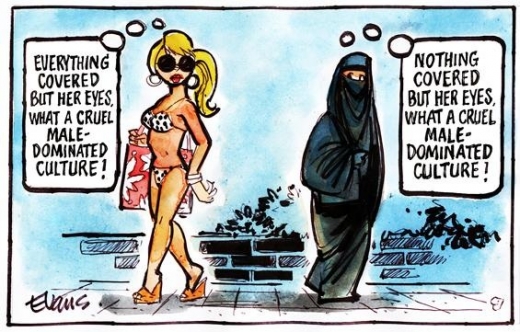
Time to think. I hope we can do it. So much social media and TV in our lives makes thinking more difficult.
The cartoon is an example of what might happen at a beach, but, of course, Muslim women wear a special bathing suit, not a burka like in the cartoon. The cartoon itself is sort of "othering" I think.
"Explainer: Why do Muslim women wear a burka, niqab or hijab?"
ABC Radio Canberra
By James Vyver
Updated 2 Oct 2014,
http://www.abc.net.au/news/2014-09-23/why-do-muslim-women-wear-a-burka-niqab-or-hijab/5761510
Westerners should not automatically feel that Muslim women wear these clothing items against their will.
"What is Otherness?"
https://othersociologist.com/otherness-resources/
"Defining Otherness
The idea of ‘otherness’ is central to sociological analyses of how majority and minority identities are constructed. This is because the representation of different groups within any given society is controlled by groups that have greater political power. In order to understand the notion of The Other, sociologists first seek to put a critical spotlight on the ways in which social identities are constructed. Identities are often thought as being natural or innate – something that we are born with – but sociologists highlight that this taken-for-granted view is not true."
Of course it is not true when it comes to politics. Thinking that would be stupid. Obviously political beliefs are mostly passed on by parents, while some beliefs can certainly evolve as we grow older.
"Rather than talking about the individual characteristics or personalities of different individuals, which is generally the focus for psychology, sociologists focus on social identities. Social identities reflect the way individuals and groups internalise established social categories within their societies, such as their cultural (or ethnic) identities, gender identities, class identities, and so on. These social categories shape our ideas about who we think we are, how we want to be seen by others, and the groups to which we belong."
"Othering 101: What Is “Othering”?"
https://therearenoothers.wordpress.com/2011/12/28/othering-101-what-is-othering/
"By “othering”, we mean any action by which an individual or group becomes mentally classified in somebody’s mind as “not one of us”. Rather than always remembering that every person is a complex bundle of emotions, ideas, motivations, reflexes, priorities, and many other subtle aspects, it’s sometimes easier to dismiss them as being in some way less human, and less worthy of respect and dignity, than we are.
This psychological tactic may have had its uses in our tribal past. Group cohesion was crucially important in the early days of human civilisation, and required strong demarcation between our allies and our enemies. To thrive, we needed to be part of a close-knit tribe who’d look out for us, in exchange for knowing that we’d help to look out for them in kind. People in your tribe, who live in the same community as you, are more likely to be closely related to you and consequently share your genes."
The key point to me relates to America's ideological divide. If you disagree with me, you are wrong, maybe even a bad person. If you are not with "us," you are the "enemy."
"It’s probably not quite as simple as the just-so story we’re describing here [Of course not, it never is. But we have to try to understand ourselves]. But there’s no doubt that grouping people into certain stereotyped classes, who we then treat differently based on the classes we’ve sorted them into, is a deeply rooted aspect of human nature. Intergroup bias is a well established psychological trait.
“If you’re not with us, you’re against us” is a simple heuristic people often use to decide whether someone is part of their tribe or not. If you are, then you can be expected to toe the line in certain ways if you don’t want to be ejected; if you’re not, you can be dismissed and hated as an “other”, the enemy."
Bottom line:
"Political partisanship is a common area for othering to be found, and will likely be a prominent focus on this site. Any American readers will surely have noticed a tendency in many of their countryfolk to speak of “Democrats” or “Republicans” with derision, imagining this “other” to be a homogeneous group."
More.
"A number of psychological experiments, such as the Asch Conformity Experiment, demonstrate the extent to which we feel compelled to make sure we fit in, as part of the tribe, in some situations."
